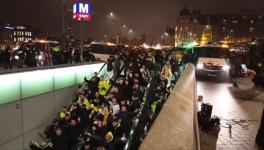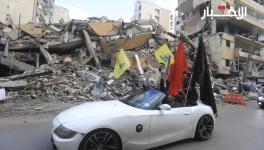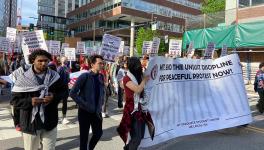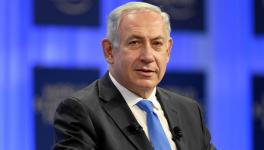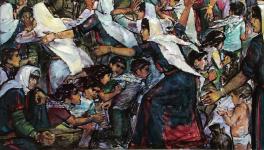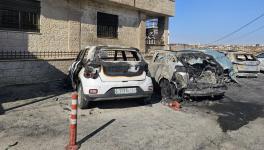Third Intifada Knocks Palestine as Israel Continues Apartheid
Prabir Purkayastha, Editor of the Newsclick and Prof. A.K.Ramakrishnan from Centre for West Asian Studies, School of International Studies, JNU, talked about the ongoing protests in Palestine against Israel occupation. Prof. Ramakrishnan believes that the Palestinians are on the verge of third Intifada as the peace talks lay defunct. They do not have any other option but to take matters in their own hands. Adding to it, Prabir spoke about the failure of Palestinian Authority in ensuring justice to the people of Gaza. He added that apart from taking formal stands in UN, the Palestinian government has failed to provide something concrete which has resulted in wide spread resistance from the people themselves. They also discussed about Geo-political situation of entire West Asia and pointed out that international community should stand in solidarity with the people of Palestine. Prof. Ramakrishnan told about the protest demonstrations against Indian President in Jerusalem and called it shameful situation for the Indian state. India and Palestine has a history of cordial relation which is based on mutual respect and willingness to act for each other’s cause. They also emphasized on need for building strong BDS campaign against the Israeli apartheid.
Rough Transcript:
Prabir Purkayastha - Hello and welcome to Newsclick. Today we have with us Prof. Ramakrishnan from the School of International Studies, Jawaharlal Nehru University.
We are seeing again a large scale break-out of resistance to the occupation in Palestine. Do you think, this signal a third Intifida?
AK Ramakrishnan - They are almost there, because they are pushed to the wall. The peace process was dead and buried for a long period of time and in October itself we have seen, more than fifty people being killed and 43-44 of them are Palestinians and there is increased violence with the Israeli incursion into the Al-Aqsa mosque and the new set of violence was initiated by that movement. And therefore the Palestinians are now once more pushed to go to take matters in their own hands. They cannot anymore depend upon the so called peace process.
PP - Two things over here. The immediate trigger seems to be whats been done in East Jerusalem, particularly the Al-Aqsa mosque compound, where it seems there are increasing incursion taking place, stopping of Muslims from going to prayers and so on. So the immediate trigger was that but the larger issue what you are raising is, really the complete break-down with the process. Is the responsibility of the Palestinian Authority in this respect also there because they seem to be taking the issue to United Nations for stopping half-way. They really not going forward either to press the United Nations, the International Court to take action against violations of international law, Criminal Court, etc; which are measures they could; because now they have a standing in the United Nations system; nor are they saying peace process is over and let Israel take over it's occupation, we give up as far as Palestinian Authority, we will not continue to play this role. Are these the two options they had or do you think that, either of these options are really not opened?
AKR - I think they have come to realise that this rhetoric of the peace process as not been working and the Palestinian Authority has been accused of in a way assisting Israel occupation by putting their own police and other agencies, which assist the occupational authority in some way or the other. And therefore, that root is no more available and that is precisely the moment when the Palestinians realised that, actually nothing is moving on the political front and therefore one has to have such a movement within the West Bank and it is coming up. More and more youngsters are joining the protests. It is becoming more or less like the first Intifada and it can turn more violent now because if they do not push the boundaries of the normality, that is created the oppressive normality. And there is no other way out.
PP - The real normality as you talked about is really slow dis-position of the lands, their emulation of their homes, changing the composition of the occupy territories, a slow demographic erosion and so on and that is particularly focused on East Jerusalem at the moment, which is where the major tension has been building up. Coming to the other issue, unlike the first and second Intifada, where the main occupation forces were really the Israeli Police and the security forces. This time, the central militias are playing a very important role. In fact, they are the ones who are at the forefront of the attacks on Palestinians. Do you think this marks a shift in the way the occupation is actually developing?
AKR - That is a very significant point. Because the settlers are armed with the extreme right-wing government of Netanyahu and they are pretty sure that, whatever they do is ultimately being sanctioned by the Netanyahu government and one could see that this is not only whats happening within the West Bank among the settlers attacking the Palestinians and more occupation of land, etc. Whats happening within Israel now like in the earlier Intifadas, the Arab community within Israel, they are citizens of Israel; Palestinians, they are also protesting. We have seen last week, at least 20,000 people demonstrating within Israel and detention of Israeli citizens without any charge which was usually reserved for the people from the West Bank or East Jerusalem. But this time that happening with the Palestinians within Israel. So you could see that like in the previous Intifadas, the Israeli violence has increased not only through the use of the militias of the settlers but also Israeli's state directly on the Israeli's citizens.
PP - What is the way immediately forward for the Palestine movements because as it stands, the Palestinian Authority is not willing to come out beyond what it is already done, making sort of formal protest if you will, but nothing on the ground. It is also interesting that, Israeli authorities are not taking over the area, which is what is run by Palestinian Authority, unlike the second Intifada when they took over these areas because they believe that they squeeze out the rest of the population into the area that, they can take over 60% of the West Bank and then rest of it become really fragmented. In this situation, what is the way out for Palestinian Authority? The PA does it have a play or will it only a sort of lip service to talks and so on?
AKR - I think the Palestinian Authority is divided on it, on these kinds of major issues of how to move forward. They may not say that but when you talk to people, you get different opinions about it. Mainly because I think the Palestinian Authority, all the leaders with some Palestinian national consciousness. They all agree on the point that, the peace process is hampered, it cannot work; but what to do, that is where the actual problem. And the leadership is such that, it's legitimacy is totally at stake, not only because of Hamas, etc as we have seen in the earlier instances but this time mostly because of the very history of Palestinian Authority and therefore to have that kind of moral and political leadership given by the current leaders, that is actually not going to work. And this is precisely why the people realised this time that, as you could see more women fighters are coming out, there is a churning that going on and thats why your first question whether the third Intifida is already or coming. The situation is very ripe for that. And the Palestinian Authority may not be interested in that because it is a problem for them. They have to suppress such movements in favor of Israel. So they do not want violence to increase beyond a point but I think at this moment, they do not have any option.
PP - But the same time, they really as you said have no option because if there is no mass protest, there have no leverage with the Israeli government to negotiate anything because more or less Netanyahu has said, we don't need talk to you, nobody is bothered about you, we can do what we want and the international community is washing hands of you; which is really what is the reality is; You can see government of India making; shall we say nice with the Israeli government; we had Mr. Modi who has been talking with his friend Netanyahu and so on...So there is this whole movement of the global order to at least close it eyes towards what is happening in Palestine. All talk about national law etc has been given go by. In this case, the only solution seems to be movements of the Palestinian people and a kind of BDS campaign in the glob, which would support them. It does it seem any other motor left for moving the Palestine issue forward, would you agree with that?
AKR - I think the Palestinian movement and as you correctly said, solidarity with that on, not simply in words but in action by the international community is extremely important and the BDS campaign is picking up in various parts of the world, not so much in India; which is the government is going along one direction, which is really hurting the Palestinian cause at this moment and it was with great sadness and shame that we could see when our President visited Ramallah, we could see Palestinians protesting against an Indian leader; for the first time may be in our history, which is really sad to see that. So if the government has pushed the people of India and Palestine to such a level with all the history of ours mutual kind of solidarity and Indian support to the Palestinian cause, our campaign for solidarity and the BDS movement, it has to pick up. There is no other way because with India, there is so much of things are stake for this state for Israel; the military, the technical, the intelligence, all kinds of relationship. If we do not make any inroads into that and break that oppressive kind of situation, where the Indian state and the Israeli state are co-ordinating now, then there is no way out for us to come out of this really, ethically demoralising situation and we have to really pick up that campaign.
PP - Thank you very much, will continue to watch what is happening in West Bank as well as in Israel proper where also the Palestinians on the streets and we will continue discussing this as the situation develops. Thank you very much.
AKR - Thank you.
DISCLAIMER: Please note that transcripts for Newsclick are typed from a recording of the program. Newsclick cannot guarantee their complete accuracy.
Get the latest reports & analysis with people's perspective on Protests, movements & deep analytical videos, discussions of the current affairs in your Telegram app. Subscribe to NewsClick's Telegram channel & get Real-Time updates on stories, as they get published on our website.










